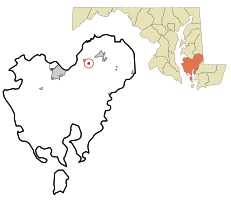East New Market, Maryland facts for kids
Quick facts for kids
East New Market, Maryland
|
||
|---|---|---|
|
||

Location of East New Market, Maryland
|
||
| Country | ||
| State | ||
| County | ||
| Incorporated | 1832 | |
| Area | ||
| • Total | 0.40 sq mi (1.04 km2) | |
| • Land | 0.40 sq mi (1.04 km2) | |
| • Water | 0.00 sq mi (0.00 km2) | |
| Elevation | 39 ft (12 m) | |
| Population
(2020)
|
||
| • Total | 389 | |
| • Density | 972.50/sq mi (375.68/km2) | |
| Time zone | UTC-5 (Eastern (EST)) | |
| • Summer (DST) | UTC-4 (EDT) | |
| ZIP code |
21631
|
|
| Area code(s) | 410 | |
| FIPS code | 24-24450 | |
| GNIS feature ID | 0590123 | |
East New Market is a small town in Dorchester County, Maryland, in the United States. In 2010, about 400 people lived there. The town has a special postal code, 21631.
Contents
Where is East New Market?
East New Market is located at 38°35′46″N 75°55′25″W / 38.59611°N 75.92361°W. It covers an area of about 0.40 square miles (1.04 square kilometers), and all of it is land.
The town is about six miles northeast of Cambridge, which is the main city in Dorchester County. East New Market is also near other county seats like Easton, Salisbury, and Denton. This means it's easy to reach from different parts of the region.
People in East New Market
| Historical population | |||
|---|---|---|---|
| Census | Pop. | %± | |
| 1880 | 242 | — | |
| 1900 | 282 | — | |
| 1910 | 280 | −0.7% | |
| 1920 | 271 | −3.2% | |
| 1930 | 222 | −18.1% | |
| 1940 | 267 | 20.3% | |
| 1950 | 264 | −1.1% | |
| 1960 | 225 | −14.8% | |
| 1970 | 251 | 11.6% | |
| 1980 | 230 | −8.4% | |
| 1990 | 153 | −33.5% | |
| 2000 | 167 | 9.2% | |
| 2010 | 400 | 139.5% | |
| 2020 | 389 | −2.7% | |
| U.S. Decennial Census | |||
Population in 2010
In 2010, there were 400 people living in East New Market. There were 169 households, and 99 of them were families. The town had about 1000 people per square mile.
Most people (80.5%) were White, and 19.5% were African American. About 2% of the population was Hispanic or Latino.
The average age in town was 39.6 years. About 22.5% of residents were under 18, and 19.5% were 65 or older. The town had a nearly equal number of males (49.5%) and females (50.5%).
History of East New Market
East New Market, once known simply as Newmarket, started in the late 1600s and early 1700s. It grew into an important social and business center for the northern part of Dorchester County.
Early Years and Important Events
The town was a place where people could get an education early on. During a religious movement called the Great Awakening, many people in the area became Methodists. Some slaveholders were convinced to free their slaves, which led to a large population of free Black people in the area.
East New Market played a role in the American Revolutionary War, the War of 1812, and the American Civil War. For example, during the Revolutionary War, a local military group called the "New Market Blues" helped the colony.
The town is known for its many old buildings, some dating back to the late 1700s. It was built along an old Nanticoke Indian path and became a busy crossroads. Travelers could find places to stay, like the "Bramble House" and "The Old Brick Hotel." When a railroad was built, even more travelers came through.
In 1776, the town was officially named "New Market." The name "East" was added in 1803 when a post office was opened. This was to avoid confusion with another town called New Market in Frederick County.
Growth and Changes in the 1800s
In 1832, East New Market officially became an incorporated town. This meant it had its own local government.
The first Methodist church in town, "Union Chapel," was built around 1810. Later, in 1848, a new church called "Trinity" was built. This happened after the Methodist Church in the U.S. split over the issue of slavery in 1844. The old Union Chapel building was then used by the Episcopal church, which became St. Stephen's Church.
The town also had different schools and academies. The first school was officially recognized by the state in 1818. Over time, public and private schools for boys and girls, and for both white and Black students, were established.
The 1900s and Beyond
By the time World War I started, East New Market was quite modern. It had its own bank, electric company, water company, and fire department. It even had a sewer system by the 1930s.
A big fire in 1914 led to the town building its own water system. This brought fresh water to homes and businesses and helped with fire protection.
In the 1950s, the local high school closed and merged with other schools to form North Dorchester High School. The elementary school also merged with a nearby town's school in the late 1970s.
The town's population declined over the 1900s, partly due to national trends like smaller family sizes and people moving to bigger cities for jobs. However, in the early 2000s, the population started to grow again, with more people choosing East New Market for retirement.
Historic Places
The central part of East New Market is recognized as the East New Market Historic District. This means it's a special area with important old buildings and history, and it's listed on the National Register of Historic Places.
Famous People from East New Market
- William Grason: A former governor of Maryland.
- Samuel Green: An African-American man who was jailed in 1857 for having a copy of the famous book Uncle Tom's Cabin.
- Thomas Holliday Hicks: Another former governor of Maryland, known for helping Maryland stay with the Union during the Civil War.
- James Sulivane: A captain in the Continental Army during the American Revolutionary War.
See also
 In Spanish: East New Market (Maryland) para niños
In Spanish: East New Market (Maryland) para niños
 | James B. Knighten |
 | Azellia White |
 | Willa Brown |


